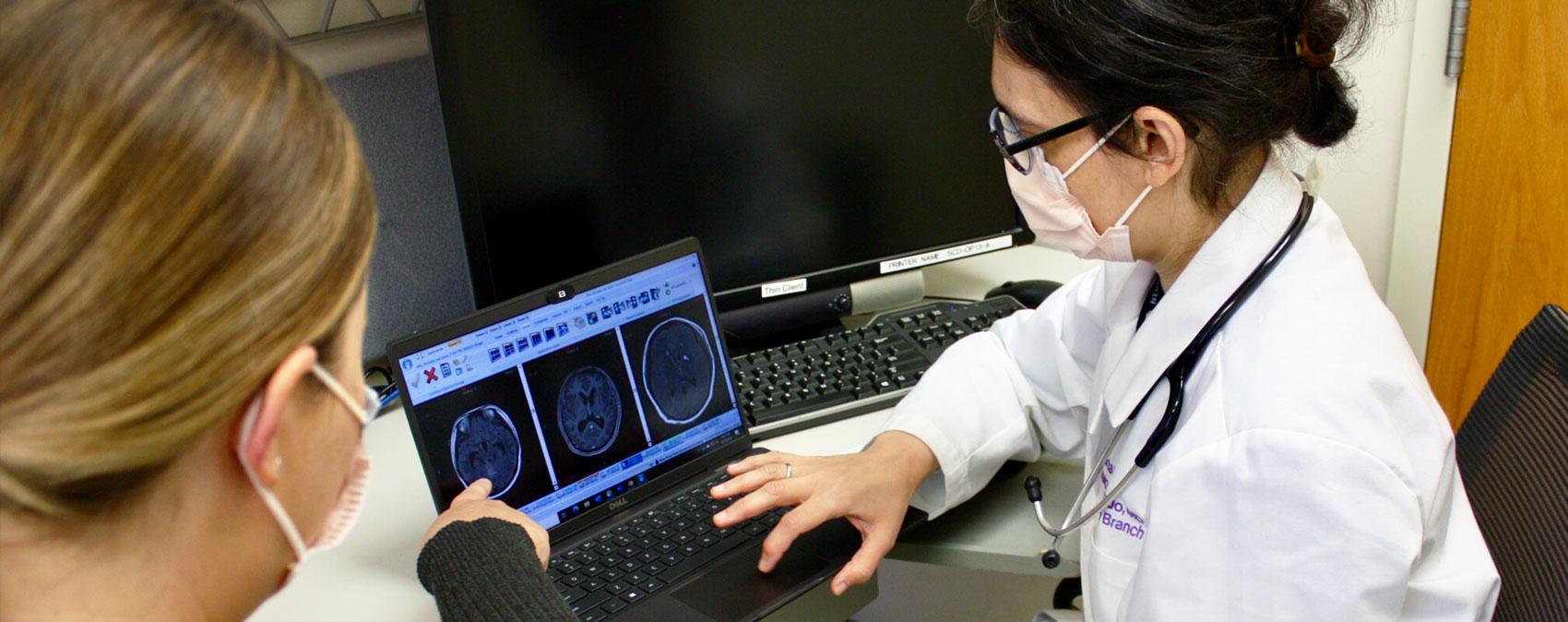At the NCI Center for Cancer Research’s Neuro-Oncology Branch (NOB), we have over 20 years of experience working with patients and their primary doctors to offer a comprehensive care plan. The NOB’s Neuro-Oncology Clinic is located at the NIH Clinical Center in Bethesda, Maryland. We provide consultations to patients who are newly diagnosed with a primary brain or spine tumor, those seeking a second opinion on their diagnosis or treatment, or those who have recurrent tumors. Patients at the NIH Clinical Center consent to participate in research studies (protocols) and are treated without charge. NIH does not bill for any services.
To request a second opinion or consultation, first have your primary doctor contact us at NCINOBReferrals@mail.nih.gov or call 1-866-251-9686 or 240-760-6010 (Monday through Friday, 9 a.m. to 5 p.m. ET) to discuss the best options for your care. Please understand that we are not accepting self-referrals or international patients at this time, but your care remains our top priority.
A Multidisciplinary Approach to Care
Consultations at the NIH Neuro-Oncology Clinic include our neuro-oncology physicians, nurse practitioners, research nurses, and social workers. Our team consults with your primary doctor first to discuss options for your care and the optimal timing of your visit to our clinic. All patients visiting the NIH Neuro-Oncology Clinic who are eligible may enroll in our Natural History Study, an observational study that helps us better understand your cancer and areas for further research and connect you with doctors and resources to manage your illness. Here are a few things to keep in mind:
- While NIH does not cover expenses for medical services at other facilities, tests and treatments at NIH are free-of-charge after you are accepted onto a clinical study.
- Our Neuro-Oncology Clinic typically offers between five and ten active clinical studies for people with primary brain or spine tumors, ranging from observational studies and symptom management to testing new drugs and tumor-focused interventions.
- If you are eligible after your consultation to participate in a clinical observational study or treatment trial, much of your direct care will be with our doctors and nurses for the duration of the study. You will also continue to be closely monitored by your referring primary doctor in collaboration with our clinical team.
Our multidisciplinary approach allows us to also help you and your loved ones cope with the physical and emotional aspects of a primary brain or spine tumor diagnosis. This includes providing resources to help you cope and understand your treatment options. We also work closely with our colleagues in neuropathology, neurosurgery, radiation oncology, and radiology—in addition to your primary doctor—to provide personalized, expert care.
Appointments
Your primary doctor should contact us first to discuss the best options for your care. Then we can decide if a visit to NIH would be beneficial, as well as the optimal timing. Have your doctor contact us at NCINOBReferrals@mail.nih.gov or call 1-866-251-9686 or 240-760-6010 (Monday through Friday, 9 a.m. to 5 p.m. ET). Please understand that we are not accepting self-referrals or international patients at this time, but your care remains our top priority.
The NIH Neuro-Oncology Clinic is located in Bethesda, Maryland on the 13th floor of the NIH Clinical Center (Building 10). View the NIH Clinical Center website for information on transportation, patient services, places to stay, and how to get around the hospital.
Anaplastic astrocytoma survivor JC and his wife Luann share their emotional experience with a life-changing diagnosis, what they have learned, and how they have chosen to live intentionally.
Neuro-Oncology Branch Resources
- NCI-CONNECT (Comprehensive Oncology Network Evaluating Rare CNS Tumors): Find more information on diagnosis and grading, tumor types, treatment options, support organizations, and tips for living with a tumor
- My STORI Mobile Application: Download this free mobile application to track and manage symptoms and self-care activities
Other NCI/NIH Patient Resources
- NIH Wellness Toolkit: Receive guidance to help improve your health needs. Learn how to manage your surroundings, feelings, body, relationships and health
- NCI Coping with Cancer Resources: Learn how to manage new feelings and emotions; adjust to your cancer diagnosis; cope with body changes and issues related to sexuality; and transition to a new normal
- NCI Brain and Spine Tumor Information: Learn more about the many different brain and spinal cord tumor types and how they are treated. Find information about brain cancer statistics, research, and clinical trials
- NCI Did you Know? Watch this video to learn about the different types of brain and other nervous system cancers in children and adults, as well as risk factors, symptoms, and survival trends
Updated: March 3, 2025
